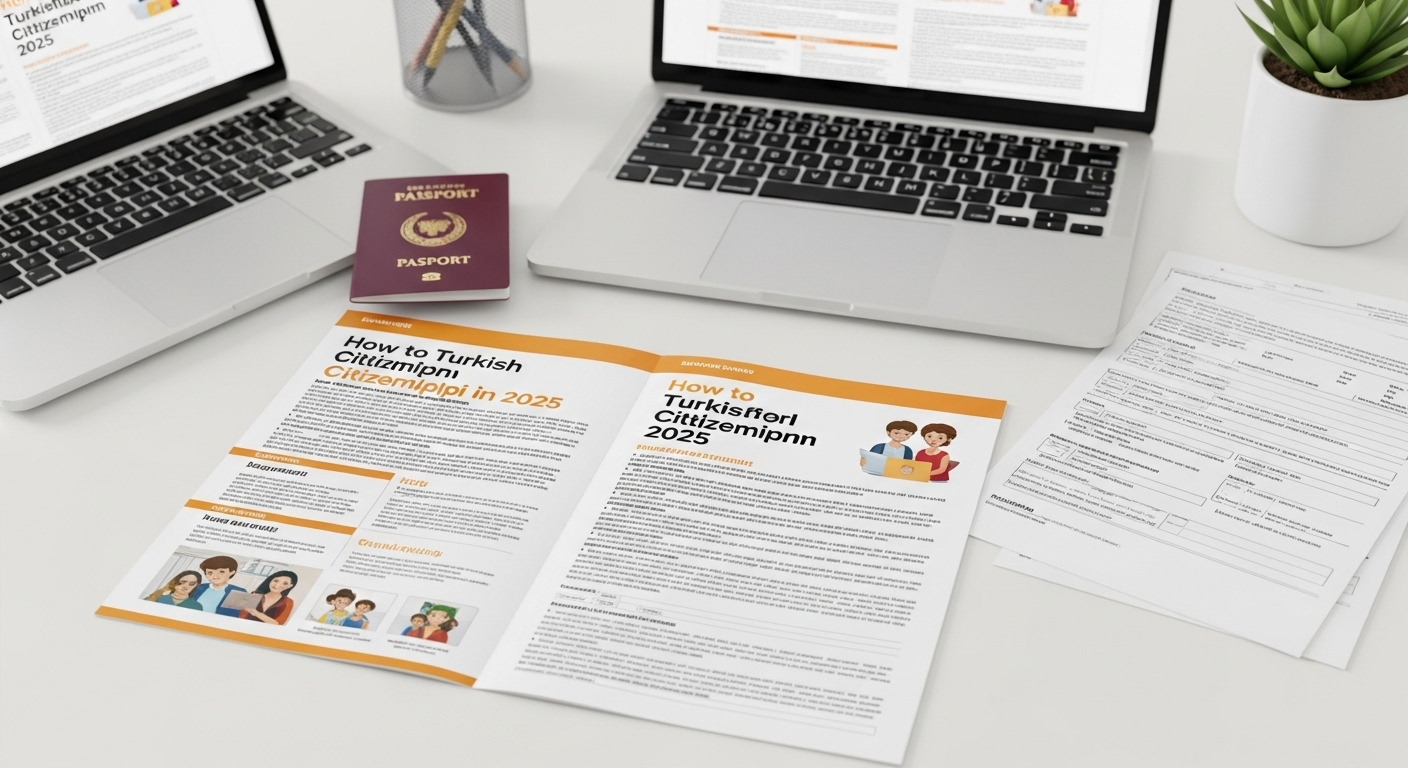How to Get Turkish Citizenship: Complete Guide 2025
Explore the most reliable routes to Turkish nationality—from marriage, investment, and long-term residency to citizenship by descent—plus key tips and pitfalls to avoid.

1. Introduction
Dreaming of living under the Turkish sun, savoring delicious kebabs, and calling the crossroads of Europe and Asia your forever home? You’re not alone. In recent years, Turkey has become one of the most attractive destinations for people seeking a second passport or a fresh start. From a vibrant culture to a strategic location and an affordable cost of living, becoming a Turkish citizen unlocks countless opportunities.
But how does one get Turkish nationality? Who is eligible? Is it complicated? In this comprehensive guide, you’ll discover every possible way to acquire Turkish citizenship, the steps you must take, what documents you’ll need, and what you can expect at each stage. Whether you’re considering marriage, investing, or simply settling down long enough to call Turkey home—there’s a route for you.
Stick with me as we unravel the process, clear the myths, and equip you with practical tips to make your journey to Turkish nationality smooth and successful.
2. Understanding Turkish Citizenship Laws
Before diving into the nitty-gritty, it’s crucial to understand how Turkish nationality laws work. Turkey’s citizenship framework is based on the principles laid out in its Nationality Law No. 5901, which has been refined over the years to accommodate the country's growing international interest.
Paths to Citizenship:
Turkey offers multiple avenues to gain nationality:
By birth or descent: Automatic citizenship for children born to Turkish parents.
By marriage: Foreigners married to Turkish citizens can apply after meeting residency and marriage duration requirements.
By long-term residence: Legal residents may apply after living in Turkey for an extended period.
By investment: A popular and fast-tracked option for those willing to invest a certain amount in Turkish real estate or businesses.
Exceptional cases: For individuals who have made significant contributions to the country.
These laws are designed to be flexible, attracting foreign investors, skilled professionals, and families alike. However, understanding the fine print and staying compliant with local regulations is key to avoiding pitfalls later.
3.Turkish Citizenship by Birth or Descent
One of the most straightforward paths to Turkish nationality is being born into it. Turkey follows the principle of jus sanguinis (right of blood), meaning a child automatically acquires Turkish citizenship if at least one parent is Turkish, regardless of where the child is born.
How it Works:
If a child is born to a Turkish father or mother, they are considered a Turkish citizen from birth.
Birth within Turkey to unknown parents automatically grants the child Turkish citizenship.
Adopted minors can also obtain Turkish nationality if adopted by a Turkish citizen.
This process is typically automatic, but you’ll need to register the birth with local authorities or the nearest Turkish consulate if the child is born abroad. The registration then adds the child to the national civil registry, which secures their legal rights as a Turkish citizen, including access to education, healthcare, and other public services.
For those with Turkish ancestry but born abroad and not registered, it’s possible to claim citizenship by proving lineage. This usually involves submitting birth certificates, family records, and other supporting documents to Turkish authorities.
4. Turkish Citizenship by Marriage
Love knows no borders, and Turkey recognizes that. If you marry a Turkish citizen, you can apply for Turkish nationality—but there’s more to it than just tying the knot.
Eligibility:
The marriage must be genuine and not solely for citizenship purposes.
You must be legally married for at least three years before applying.
The marriage must still be ongoing at the time of application.
Application Process:
Live together with your spouse and build a shared life.
After three years, apply at your local Provincial Directorate of Population and Citizenship or the nearest Turkish consulate if abroad.
Provide supporting documents, such as marriage certificate, proof of cohabitation, and identity documents.
Attend an interview to prove the marriage is genuine.
Authorities may conduct home visits or request additional documents to confirm the relationship’s authenticity. If the marriage ends due to the death of the Turkish spouse, the foreign spouse may still apply if they meet certain conditions.
It’s worth noting that fraudulent marriages carry serious consequences, including imprisonment and deportation. So if you’re planning to build a life together, this pathway is straightforward and rewarding.
5. Turkish Citizenship by Investment
In recent years, Turkey has become a hotspot for investors seeking a passport with global mobility and a business-friendly environment. Turkey’s Citizenship by Investment Program (CIP) is one of the fastest and most accessible in the world.
Minimum Investment Requirements:
As of now, you can qualify by fulfilling one of the following:
Purchase real estate worth at least $400,000 USD and commit to keeping it for at least three years.
Make a fixed capital investment of at least $500,000 USD approved by the Ministry of Industry and Technology.
Deposit at least $500,000 USD in a Turkish bank and keep it for three years.
Create jobs for at least 50 Turkish citizens.
How It Works:
Choose your investment type and complete the transaction.
Obtain a Certificate of Eligibility from the relevant government authority.
Apply for a residence permit (if you don’t already have one).
Submit your citizenship application along with required documents.
The process typically takes 3-6 months, making it one of the quickest ways to secure a Turkish passport. Many opt for the real estate route because of Turkey’s booming property market, which promises both residency and a profitable investment.
Benefits include visa-free or visa-on-arrival access to over 110 countries, potential tax benefits, and the right to live, work, and study in Turkey.
6.Turkish Citizenship by Long-Term Residence
Not interested in marriage or investing a large sum? No problem—Turkey also offers citizenship to foreigners who commit to living and integrating into Turkish society over time. This is a slower but steady route for expats, retirees, and digital nomads who fall in love with the country and decide to make it their permanent home.
Residency Requirements:
To qualify for Turkish nationality by long-term residence, you must:
Legally reside in Turkey for at least five consecutive years without significant interruption.
Demonstrate that you have sufficient income to support yourself and your dependents.
Show that you have adapted to Turkish culture and society.
Continuous Living Criteria:
“Continuous residence” means you shouldn’t leave Turkey for more than six months within any year during the required period. Short trips abroad for holidays or business are acceptable, but extended absences might reset your residency clock.
In addition to the time requirement, applicants must prove good moral character and no criminal record. Proficiency in the Turkish language is also expected, although the level needed is generally conversational and can be demonstrated during an interview.
Application Steps:
Obtain a long-term residence permit, typically by renewing short-term permits each year.
Maintain your legal residence status and keep your address updated with local authorities.
After five years, gather necessary documents: passport, residence permits, proof of income, language ability, and a clean criminal record.
Apply through the Provincial Directorate of Population and Citizenship.
This path is favored by expats who want to deeply root themselves in Turkish society, build friendships, and contribute to the local community. It’s not a quick fix, but for many, the gradual transition feels natural and rewarding.
7. Exceptional Citizenship
Turkey reserves the right to grant citizenship to foreigners in special circumstances, even if they don’t meet the usual requirements. This is called Exceptional Citizenship, and it’s generally awarded to individuals who make significant contributions to Turkey’s economy, culture, or global reputation.
Who Qualifies?
Investors bringing in substantial foreign capital.
Artists, athletes, scientists, and academics whose work elevates Turkey’s prestige on the world stage.
Individuals providing notable services in areas like technology, defense, or humanitarian aid.
While there is no clear-cut checklist for this pathway, applicants are usually nominated by a government ministry or high-level authority. The Council of Ministers then evaluates and approves these cases on a discretionary basis.
Famous Examples:
In recent years, several high-profile foreign athletes and businessmen have received Turkish citizenship for their contributions to national sports or strategic investments. This category is less common for the general public but serves as an incentive for outstanding talents and high-impact entrepreneurs to choose Turkey as their base.
If you believe you have a unique contribution that aligns with Turkey’s national interests, consulting a legal advisor who specializes in nationality law can increase your chances under this rarely used, but powerful, pathway.
8. Required Documents for Application
No matter which route you choose, paperwork is key. Preparing a complete and accurate set of documents will make your application smoother and faster, saving you from frustrating delays.
General Document Checklist:
Here’s what you’ll generally need:
A valid passport and copies.
Four recent biometric passport-size photos.
Birth certificate or equivalent document.
Proof of legal residence (residence permits).
Proof of income or investment (bank statements, property deeds, or capital investment certificates).
Marriage certificate (if applying by marriage).
Criminal background check from your home country and from Turkey.
Proof of Turkish language proficiency (in some cases).
Additional Documents:
Depending on your specific method, you might also need:
Certificate of Eligibility (for investment-based applications).
Title deed and property valuation report (for real estate investment).
Documents proving your relationship if applying by descent.
Evidence of continuous cohabitation (utility bills, lease agreements) for marriage-based applications.
All foreign documents must usually be notarized and translated into Turkish by a sworn translator, and some may require an apostille for international validation.
Staying organized and double-checking that every document meets official standards will keep your application from ending up in the “pending” pile. Many applicants hire licensed lawyers or immigration consultants to help manage the paperwork—especially for investment cases where large sums are at stake.
9. Step-by-Step Application Process
So, how exactly do you apply for Turkish citizenship once you have your documents lined up? Here’s a practical step-by-step guide to help you navigate the process with confidence.
1. Decide on Your Pathway:
Are you applying by marriage, investment, residence, or descent? Knowing this determines which documents and offices you’ll need to deal with.
2. Collect Required Documents:
Gather original copies and certified translations. If you’re abroad, contact your nearest Turkish consulate for help.
3. Submit Your Application:
Inside Turkey: Visit the Provincial Directorate of Population and Citizenship Administration in your city.
Outside Turkey: Apply at the Turkish Embassy or Consulate in your country.
4. Pay Application Fees:
Fees vary depending on the application type and whether you need extra services like translation or notary certification.
5. Attend an Interview:
For marriage and long-term residence applicants, an interview is common. You might be asked about your background, reasons for wanting citizenship, and your integration into Turkish life.
6. Wait for Background Checks:
The Ministry of Interior reviews your file, checks your background, and may request more documents. This can take several months.
7. Receive Approval:
If successful, you’ll get an official letter or call to collect your Turkish identity card (kimlik) and passport.
Tips for a Smooth Process:
Double-check all forms for errors.
Keep copies of every document you submit.
Be polite and patient with government officials—they can be a huge help if you show respect.
Consider hiring a reputable legal advisor, especially for high-value investments or complex cases.
10. Common Mistakes to Avoid
Many applicants make avoidable mistakes that cost time, money, and sometimes their chance at becoming Turkish citizens. Here are the biggest pitfalls—and how to dodge them.
1. Incomplete or Incorrect Paperwork:
Even a missing page or an outdated certificate can delay your application for months. Always double-check the current requirements on official websites or with a lawyer.
2. Misunderstanding Investment Rules:
Some applicants rush to buy property thinking any real estate qualifies. In reality, not all properties are eligible for citizenship. The property must meet the minimum value and be officially approved for the program. Get a valuation report and work with certified real estate agents.
3. Ignoring Residency Obligations:
Long-term residence applicants often fail to maintain continuous residence. Frequent long trips abroad can reset your eligibility clock, pushing your citizenship dream further away.
4. Fake Marriages:
Attempting a sham marriage to get citizenship is illegal and risky. Turkish authorities are thorough and won’t hesitate to deport or prosecute fraudsters.
5. Relying on Unofficial Agents:
Beware of shady “consultants” promising fast-tracked applications for an extra fee. Always verify licenses and reviews before hiring help.
How to Avoid These Traps:
Stay updated with official sources like the Directorate General of Migration Management and Turkish embassies.
Consult certified immigration lawyers, especially for investments and complex family situations.
Keep records and receipts of all payments and agreements.
A bit of caution and diligence goes a long way in turning your dream of Turkish citizenship into a reality—without unpleasant surprises.
11. Costs and Fees Involved
Let’s talk money—because while the dream of Turkish citizenship is priceless, the process certainly isn’t free. Whether you’re investing big bucks in property or applying through marriage or residency, there are costs you need to budget for to avoid unexpected surprises.
Government Fees:
Each application comes with standard government charges. These vary depending on the pathway but generally include:
Application submission fees
Residence permit fees (for long-term residents)
Passport issuance fees after approval
Notary and translation certification fees
For investment-based applications, there are extra steps like property valuation reports and title deed taxes—these can add a few thousand dollars to your bill.
Legal and Consultant Costs:
Many applicants, especially investors, hire immigration lawyers or certified consultants to ensure compliance with Turkish law. Professional fees for reputable firms range from $2,000 to $10,000, depending on the complexity of your case and the services provided (such as document prep, translations, and liaising with government offices).
Hidden Expenses:
Don’t overlook these common extras:
Property taxes and maintenance if you buy real estate.
Health insurance for residence permits.
Courier and apostille charges for international documents.
Translation and notarization costs for every foreign document.
For investment citizenship, expect the total cost (including investment and all fees) to start at around $420,000—covering property, taxes, lawyer fees, and miscellaneous expenses. While this is a significant amount, many applicants see it as a strategic investment in both a second passport and a profitable asset in Turkey’s real estate market.
Pro Tip:
Always ask for itemized quotes from consultants and lawyers before signing any contract. This helps avoid hidden charges and ensures you’re not paying for unnecessary services.
12. Benefits of Having Turkish Citizenship
So, is it worth it? Let’s look at what you gain once you hold that coveted Turkish passport in your hands.
Visa-Free Travel:
A Turkish passport allows visa-free or visa-on-arrival access to over 110 countries, including Japan, South Korea, Singapore, and most of Latin America. While it doesn’t currently offer visa-free access to the EU or the USA, Turkey has agreements that make travel smoother than many other non-EU passports.
Dual Citizenship:
Turkey allows dual citizenship, so you don’t have to give up your original nationality unless your home country forbids it. This flexibility means you can enjoy the rights and benefits of both countries.
Rights and Protections:
As a Turkish citizen, you enjoy the same rights as native-born citizens:
Access to public healthcare and education
Voting rights in national and local elections
The right to work in any profession without special permits
Social security and pension benefits
Business Advantages:
Turkey is a gateway to Europe, Asia, and the Middle East. Citizenship makes it easier to do business, own property, and benefit from local and regional trade agreements. Many global entrepreneurs use a Turkish passport to expand their operations in Eurasia.
Family Benefits:
Your spouse and children under 18 can usually acquire citizenship alongside you. This makes Turkey’s program highly attractive for families looking for a safe, vibrant place to live with good schools, a rich cultural life, and friendly communities.
In short, Turkish citizenship isn’t just a document—it’s a key to better mobility, economic opportunities, and a fulfilling lifestyle in one of the world’s most unique crossroads of cultures.
13. Challenges and Drawbacks
While the benefits are appealing, it’s fair to know the downsides too. Understanding the challenges helps you prepare better and avoid surprises.
Tax Implications:
Turkey taxes its residents on worldwide income. So if you live in Turkey more than six months a year, your global income may be subject to Turkish taxes. However, there are tax treaties with many countries to avoid double taxation—always consult a tax advisor to structure your finances wisely.
Military Service Obligation:
Male Turkish citizens between 20 and 41 may be required to complete compulsory military service. However, naturalized citizens can sometimes be exempt or pay a fee in lieu of service, depending on when they acquire citizenship and their age at the time. Always check your specific situation.
Possible Renunciation:
While Turkey allows dual citizenship, not all countries do. Some countries may require you to renounce your original citizenship upon acquiring Turkish nationality. Research your home country’s laws before proceeding.
Language and Cultural Integration:
Despite Turkey’s warm hospitality, adjusting to a new language, bureaucracy, and cultural norms can be challenging at first. Many new citizens find that learning Turkish and understanding local customs makes life much easier and more enjoyable.
Bureaucracy:
Turkey’s bureaucratic processes can be slow and sometimes confusing for foreigners. Paperwork, local regulations, and communication barriers may cause delays, so patience is key.
In short, while Turkish nationality opens many doors, it’s smart to weigh the obligations alongside the perks to make sure it aligns with your long-term life plans.
14. Frequently Asked Questions about Turkish Citizenship
How long does it take to get Turkish citizenship?
It depends on the pathway. Investment-based applications are the fastest, often taking 3-6 months. Citizenship by marriage or long-term residence can take a few years due to residency requirements and additional background checks.
Can my family get citizenship too?
Yes! For investment-based applications, your spouse and children under 18 can acquire citizenship at the same time. For marriage or residence-based paths, each family member must qualify individually or be included in your application where allowed.
Do I have to live in Turkey full-time?
For investment citizenship, you don’t need to live in Turkey full-time—but you must hold your investment for at least three years. For long-term residence-based citizenship, living in Turkey continuously is mandatory.
Can Turkish citizenship be revoked?
Yes, in rare cases—mainly if it was obtained fraudulently or if you pose a serious threat to national security. Otherwise, it is generally permanent.
Will I lose my original nationality?
Turkey allows dual citizenship, but check if your country of origin permits it. Some nations require renunciation of your old passport when gaining a new one.
15. Conclusion
Obtaining Turkish nationality is more than just paperwork—it’s an adventure and a life-changing decision. Whether you’re investing in a dream property by the Aegean coast, marrying the love of your life, or building a new life step-by-step as a resident, Turkey welcomes you with open arms and a rich blend of East and West.
It’s a country where ancient history and modern living coexist beautifully, where you can sip tea overlooking the Bosphorus in the morning and enjoy vibrant nightlife by evening. The benefits of Turkish citizenship open doors to new opportunities, but it’s important to follow the right path, stay informed, and plan wisely.
If you’re ready to take the plunge, start gathering your documents, connect with trusted advisors, and take your first step towards calling Turkey home. The journey might take time and patience, but the rewards are worth every effort.
Have Question Or Suggestion ?
Please Share Your Thought, To Make It Real







.webp)


